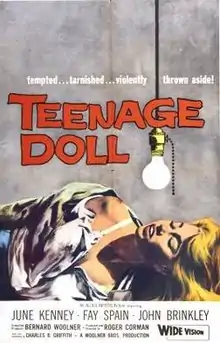Teenage Doll
Teenage Doll is a 1957 film noir directed by Roger Corman, starring June Kenney and John Brinkley. It was financed by Lawrence Woolner, who had previously made Swamp Women with Corman. One writer called it Corman's "most impressive teen flick".[1]
| Teenage Doll | |
|---|---|
 Theatrical release poster | |
| Directed by | Roger Corman |
| Produced by | Roger Corman executive Bernard Woolner associate Lawrence Woolner |
| Written by | Charles B. Griffith |
| Starring | June Kenney John Brinkley Fay Spain |
| Music by | Walter Greene |
| Cinematography | Floyd Crosby |
Production company | Woolner Brothers |
| Distributed by | Allied Artists |
Release date |
|
Running time | 71 min. |
| Country | United States |
| Language | English |
Plot
The Black Widows, a teenage girl gang, find one of their number killed; they suspect Barbara, sometime girlfriend of Eddie Rand, the leader of rival gang the Vandals. As the gangs prepare for a rumble, we glimpse the members' home lives, exaggerating every type of family dysfunction.
The leader of the Black Widows is Hel (Helen) who decides to offer Rand money to turn Barbara over to them. The gang need to raise money. Squirrel/Eva, takes money from the cash register of her parents' restaurant. Lorrie takes money sent by her father to support her impoverished younger sister. May gets money off her older sister, Janet, who is dating her boss. Hel finds her father cheating on her mother.
Barbara is the daughter of a policeman but doesn't tell her father what happened. Detective Dunston starts an investigation into the girl's death.
The Black Widows gather money then go looking for Barbara. She escapes to the Vandals' clubhouse. Rand agrees to help her.
The Vandals prepare for battle so the Black Widows call in their male gang, the Tarantulas. The rumble begins, and Barbara escapes as the police arrive. Bett and Squirrel decide to leave the gang.
Cast
- June Kenney as Barbara Bonney
- Fay Spain as Helen
- John Brinkley as Eddie Rand
- Colette Jackson as May
- Barbara Wilson as Betty Herne
- Ziva Rodan as Squirrel, also known as Eva
- Sandy Smith as Lorrie
- Barboura Morris as Janet
- Richard Devon as Det. Dunston
- Jay Sayer as Wally
- Richard Cutting as Phil Kern
- Dorothy Neumann as Estelle Bonney
- Ed Nelson as Police Officer 'Dutch' / Blind Man
- Bruno VeSota as Témoin
- Abby Dalton (uncredited)
Production
Roger Corman made the film for syndicates of theater owners, the main ones who were the Woolner Brothers, who had financed Corman's Swamp Women.[2]
Charles Griffith was hired to write the script, based on an idea by Bernard Woolner. He said "They wanted a gang picture, as it was the time of the street gangs and juvenile delinquents. I told them I had one called “The Rat Pack” and they said they wanted a girl gang. So I got to work on Teenage Doll, which was Larry Woolner taking the title of [Elia] Kazan’s Baby Doll [1956]. But the Johnson Bureau, or the Hays Office – I forget which was in at the time – rejected the story."[3] This meant Griffith had to rewrite the script over the weekend:
In the original version, the girls were all stealing weapons or making weapons in order to kill the good girl...I wrote all these jokes in English to be said in Spanish. Roger called up the only Spanish agent around for that and it wound up that they were the best actors in the picture. But they were in the background the entire time! In the foreground, this Mexican girl makes a potato grenade. She sticks a potato peeler in one end for a handle and then a double-edge razor-blade all around the potato so she could just flip the handle and the grenade would hit somebody...Another girl stole her father’s pistol from his holster and, while she’s stealing it from his bed, the phone rings and the father has a conversation on the phone without opening his eyes and hangs up again. But the Hays office made me change these things so that they were stealing these weapons to sell for money to get a lawyer to attack the girls in some legal way. I mean really obnoxious and really stupid. It all had to be redone overnight.[3]
Filming started 28 February 1957.[4] Fay Spain's casting was announced in March.[5]
Reception
Variety said the film's "Unremitting and unconvincing downbeat tenor, clumsily executed, deadens b.o. chances for any audience outside of sex-and-sadism fanciers. Characters in Charles B. Griffith screenplay talk a stylized jargon mainly derivative of other pix of this genre; engage In continual brutality and violence; and their motivations, delinquent or otherwise, bears only the, slightest resemblance of those' human beings."[6]
See also
References
- Kings of the Bs : working within the Hollywood system : an anthology of film history and criticism. E. P. Dutton. 1975. p. 225.
- Ed. J. Philip di Franco, The Movie World of Roger Corman, Chelsea House Publishers, 1979 p 84
- Aaron W. Graham, 'Little Shop of Genres: An interview with Charles B. Griffith', Senses of Cinema, 15 April, 2005 accessed 25 June 2012
- Fred Clark in Tip-Top Comedy Role; 'Godfrey' Claiming David Niven Schallert, Edwin. Los Angeles Times 20 Feb 1957: C7.
- New Policy Set at Players' Ring Los Angeles Times 16 Mar 1957: B2.
- Review of film at Variety
External links
- Teenage Doll at IMDb
- Teenage Doll at TCMDB
- Teenage Doll at Letterbox DVD
- Review at DVD Savant
- Teenage Doll at BFI